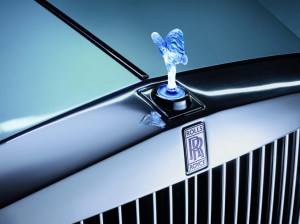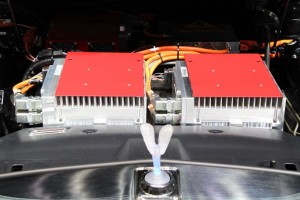
Is Rolls-Royce ready to plug into battery power? The 102EX concept is serving as the anchor of a year-long feasibility study.
With U.S. regulators looking at 56 mpg fuel economy standards and their European counterparts talking about 100 mpg, where does a company like Rolls-Royce, making massive metal tanks like the Phantom, fit in?
That’s a question the British marque is desperately trying to answer as it studies response to its battery-car prototype.
A subsidiary of Germany’s BMW — which also faces challenges meeting strict new fuel economy and emissions laws — Rolls has been exploring the seemingly unlikely idea of going electric. Its 102EX Concept made its debut at the Geneva Motor Show, earlier this year.
Considering the amount of leather and wood, never mind leather and steel, that goes into the typical Rolls-Royce, it may never win an environmental award – though it might take credit for using renewable resources and more earth-friendly methods. The big challenge will be to reduce what comes out of the tailpipe.
In this case, make that no tailpipe, the 102EX running solely on what is estimated to be as much as 40 kilowatt-hours of lithium-ion batteries. Using improvements in aerodynamics, and by adopting a variety of lighter-weight materials, such as aluminum and carbon fiber, the prototype is expected to get as much as 100 miles per charge.
“With this vehicle, we begin an exploration into alternative drive-trains, seeking clarity on which alternative technologies may be suitable to drive Rolls-Royce motor cars of the future,” Rolls-Royce CEO Torsten Müller-Ötvös explained earlier this year, launching a year-long feasibility study.
But the real question is how potential customers respond. And that’s something the maker is carefully monitoring. Company sources say it’s been a slow sell, and early reaction was anything but overwhelming. But it may be shifting.
“If you’d have come here 12 months ago and asked our customers, ‘What do you think about alternative fuels,’ they would have said, ‘What are you talking about,’” Rolls-Royce North America President David Archibald told Tire Kicking magazine.
While there’s beginning to be a customer understanding that Rolls may not have a choice but to find green alternatives, Archibald cautioned, “It’s really too early to say” if a production version of the 102EX will become part of the line-up.
Rolls, of course, isn’t the only luxury maker facing the conundrum of maintaining its classic attributes while also meeting new regulations that might force massive downsizing. Parent BMW has been toying with a variety of alternatives, from hydrogen to hybrids, and is readying the launch of a new brand-within-a-brand dedicated to electric vehicles large and small, such as the i3 city car and bigger i8.
Meanwhile, direct competitor Bentley has been taking steps to slash the fuel consumption of its own big-block engines and adopt flex-fuel capabilities. A new model, smaller than the current Continental line, is under study. But it may also be considering ways to electrify the line-up in the years ahead.

